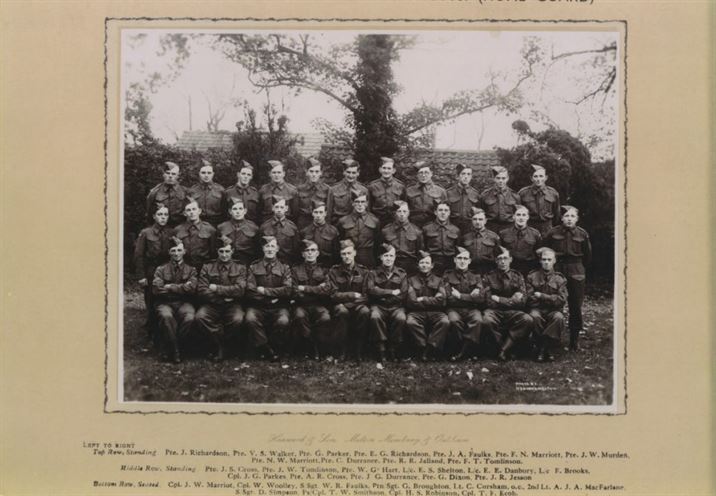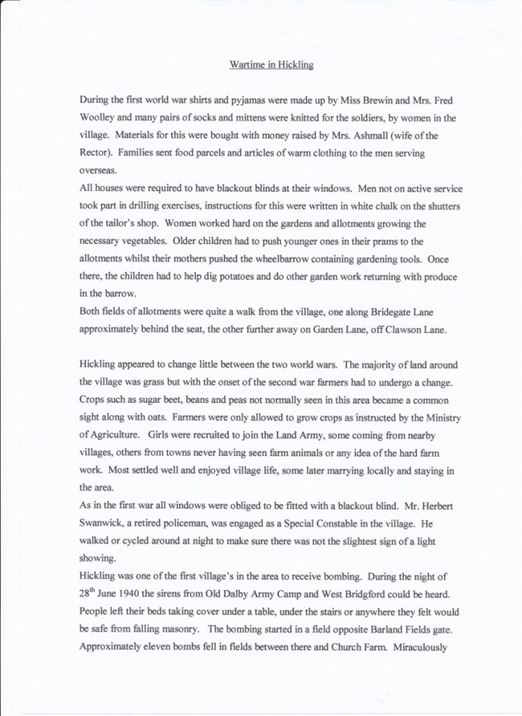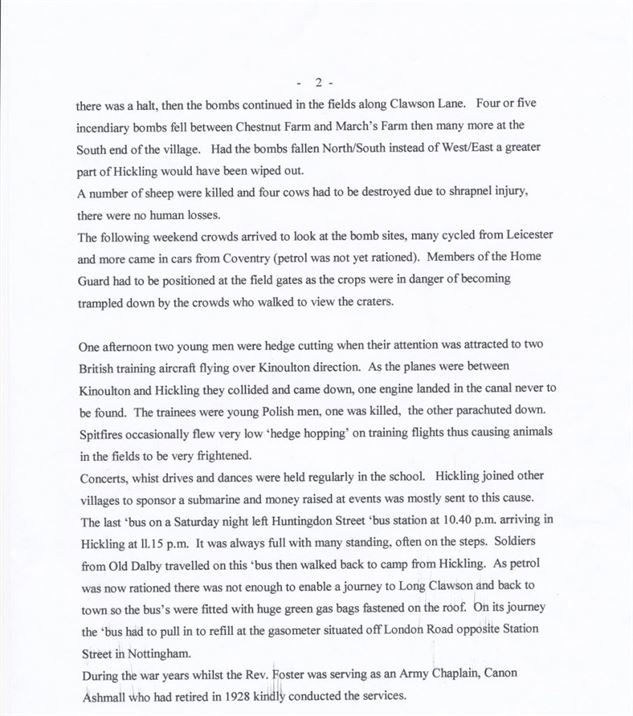Unfortunately, we have very little information from World War II and there is no Roll of Honour; if you can help to build a picture of Hickling and the soldiers that served between 1939 and 1945, we would like to hear from you:
Three Men from Hickling died whilst serving during World War II:
- Cyril Ernest Hollingworth Flight Engineer RAF 103 squadron; died 9th January 1943
- Charles (Peter) Peters Wright 5th Battalion Leics Regiment; died 22nd February 1943
- Thomas Cecil Starbuck Bombardier 24th Field Regt Royal Artillary; died 16th February 1944
The Wadkin Archive includes a brief account of Hickling during WWII:

D-Day Landings – 80th Anniversary (6th June 2024)
Thank you, Richard Collishaw, for this perfect tribute.
Hickling Parish Council commemorated the 80th anniversary of the Normandy landings on 6th June 1944 by flying the official D-day 80 Flag of peace from the Village Hall.
The D-Day landings of 6th June 1944 were the largest seaborne invasion in history. Along with the associated airborne operations, it marked the beginning of the liberation of France and western Europe.
Proclamation by Chris Ashdown, Ex Household Cavalry: “Today we commemorate the 80th anniversary of the D-Day landings in Normandy, France – an incredible achievement in military planning and logistics uniting brave service personnel from air, sea and land forces at the beginning of Operation Overlord.
By the day’s end, over one hundred and fifty thousand Allied troops had successfully stormed the now famous Gold, Juno, Sword, Utah and Omaha beaches to achieve a toehold in France.
In the weeks that followed, the Allies fought bitterly against a determined foe from the unforgiving countryside of Normandy to the liberation of Paris two months later.
We should all remember and never forget the selfless sacrifice and courage of all those involved and use this Commemoration to pay our tribute
to those who gave so much to secure the freedom we all enjoy today.
God Save the King”
Hickling Parish Council: click here (pdf) or click here (weblink)
VE Day 80th Anniversary Commemoration: Village Hall Breakfast, 4th May 2025

Hickling commemorated the 80th anniversary of VE Day at the Village Hall Breakfast on Sunday May 4th; Tim McEwen acted as the Village Crier once again with councillors John Cottee, Neil Clarke and Tina Combellack also in attendance.
CELEBRATIONS IN HICKLING (Carol Beadle)
On SUNDAY 4 MAY 2025, there were 2 celebrations in Hickling Village Hall. The HICKLING SUNDAY BREAKFAST CLUB had completed 15yrs of serving the local community. During this time about 14 volunteers have turned up at each breakfast to cook and serve about 100 people. The breakfasts are so popular that people regularly travel from the other side of the County to attend as well as people coming from many of the surrounding villages. If you have never attended a breakfast, please come along in October when the breakfasts resume after a summer break. During the last 15yrs, the breakfasts have raised over £40,000 for the Village Hall and local charities. On Sunday, John Cottee, the local re-elected Councillor, gave a ‘thank you’ on behalf of himself and all those who enjoy the breakfasts so much. He gave thanks to all the volunteers who give up their time so willingly for this community event.
At this special breakfast, 80yrs since VE Day was also celebrated. Hickling Village Hall was decorated with flags, war time posters and bunting. The breakfast tables followed the same theme with mini flags and cardboard planes. Everyone attending enjoyed a glass of ‘bubbly’ and a VE Day cup cake. Tim McEwan, dressed in appropriate costume, welcomed visitors by ringing a bell. The day was very uplifting and enjoyable for all. Everyone attending was delighted to be given their own ration book menus but pleased that powdered egg; camp coffee and spam were not on the 2025 menu. It was nice that Hickling Village was able to participate in celebrating VE Day 80yrs on, thanks to the Village Hall Committee.























80th Anniversary of the end of WWII
The end of World War II in Germany was marked by a series of significant events, culminating in the unconditional surrender of German forces in May 1945. Here are the main events that led up to this outcome:
- 1. D-Day (6 June 1944): The Allied invasion of Normandy, known as D-Day, marked the beginning of a major offensive against German forces in Western Europe. This invasion opened a new front, leading to the liberation of France and putting additional pressure on Germany.
- 2. Liberation of France (Summer 1944): Following D-Day, Allied forces quickly advanced through France. By late August 1944, Paris was liberated, and the Allies continued to push into Germany from the west.
- 3. Soviet Advances in the East (1944): The Soviets launched several successful offensives against German forces on the Eastern Front. Notable battles include the Battle of Stalingrad (1942-1943) and the Battle of Kursk (July-August 1943), which significantly weakened the German Army. In 1944, the Soviets liberated much of Eastern Europe, including Poland and the Baltic states.
- 4. Operation Market Garden (September 1944): This Allied operation aimed to secure key bridges in the Netherlands. Although it was initially successful, it ultimately failed to achieve its objectives, delaying the Allied advance.
- 5. Battle of the Bulge (December 1944 – January 1945): This was Germany’s last major offensive on the Western Front, aimed at splitting the Allied forces. While initially successful, the offensive ultimately failed, leading to heavy German losses.
- 6. Fall of Berlin (April – May 1945): In April 1945, Soviet forces began their final assault on Berlin. The city was encircled, and after intense fighting and it fell to Soviet troops on 2 May 1945.
- 7. Hitler’s Suicide (30 April 1945): Adolf Hitler committed suicide in his bunker in Berlin as defeat loomed imminent. His death marked the end of Nazi leadership.
- 8. Unconditional Surrender (7 May 1945): Following the fall of Berlin and the collapse of German resistance, German military leaders signed an unconditional surrender. This was formally enacted on 8 May 1945, known as V-E Day (Victory in Europe Day).
Michael Chapman: British Legion, Vale of Belvoir Branch
Please note: this is a large gallery and may take a little while to load to your screen.
This gallery is from the Wadkin Archives

































